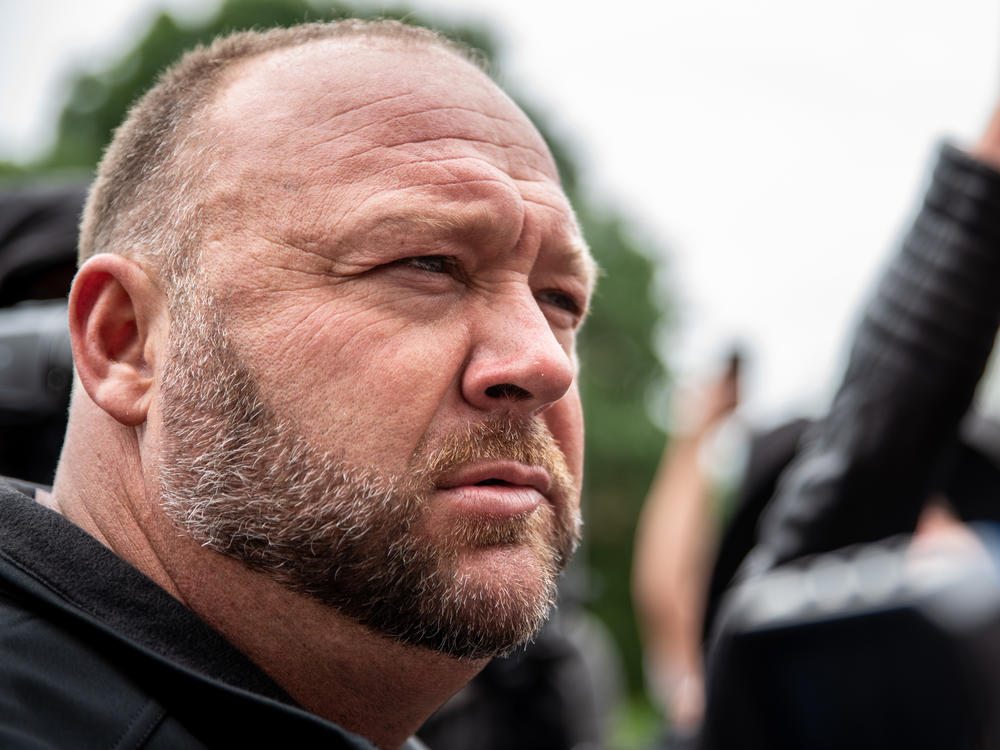Section Branding
Header Content
A jury says InfoWars' Alex Jones must pay 2 Sandy Hook parents more than $4 million
Primary Content
An Austin, Texas, jury today awarded the parents of a slain first-grader $4.1 million dollars for mental anguish caused by conspiracy broadcaster Alex Jones' falsehoods about the Sandy Hook school shooting.
The two-week trial became at times emotional as the parents confronted Jones for the first time in the courtroom.
"I am a mother, first and foremost, and I know that you're a father. And my son existed," said Scarlett Lewis, the mother of six-year-old Jesse Lewis, who was gunned down along with 25 other children and school staffers in 2012 at Sandy Hook Elementary School in Newtown, Conn.
"You're still on your show implying that I'm an actress, that I'm deep state," she continued, "and I don't understand. Truth is so vital to our world."
Jones claimed over and over again on InfoWars, his radio and internet platform, that the elementary school massacre was staged by the federal government as a pretext to crack down on guns.
"Sandy Hook is synthetic, completely fake with actors, in my view, manufactured," he said in 2015.
While the pugnacious conspiracy theorist has been booted off Twitter, Facebook, YouTube and other mainstream platforms for promoting hate speech and lies, Infowars is still broadcast on a hundred radio stations, and its website still draws millions of visitors a month.
During the trial, Jones' company, Free Speech Systems LLC, filed for bankruptcy. It listed $14.3 million in assets and $79 million in liabilities. But in the next phase of Jones' trial, the parents' lawyers will argue that he is hiding millions of dollars in assets.
A new book, Sandy Hook: An American Tragedy and the Battle for Truth, says the Infowars online store brought in $50 million in revenue in a single year by selling alternative medicines, freeze-dried food, survivalist gear and other items.
Parents describe a decadelong 'living hell'
The parents, Neil Heslin and Scarlett Lewis, testified that they lived through stalking, death threats and harassment from dangerous followers of InfoWars, and that they suffered panic attacks and had to go into hiding. Their attorney said the threats continued in Austin during the trial, forcing them to travel with a security detail.
"I can't even describe the last nine-and-a-half years," a tearful Heslin told the jury, "the living hell that I and others have had to endure because of the recklessness and negligence of Alex Jones."
In his defense, Jones told the said on the witness stand that, "I never intentionally tried to hurt you. I never even said your name until this case came to court." He also said that he eventually acknowledged the school massacre was real, not fake.
He described himself as an opinionated pundit protected by the First Amendment, and portrayed the defamation trial as a "kangaroo court" trying to silence free speech in America.
A warning shot to other conspiracy theorists?
Bill Adair, a journalism professor at Duke University and co-founder of the International Fact-Checking Network, said the judgment shows the limits of the First Amendment.
"I think a big award like this shows that people need to be responsible about what they say," Adair said. "I think that some people have operated under the belief that they can just lie freely and not worry about the consequences."
Adair said that because of Jones' outsized reputation, the $4.1 million verdict "could serve as a deterrent to others who might go on various platforms and make wild, ridiculous, unfounded claims."
Jones also has been a huge supporter of former president Donald Trump, and was at the rally near the U.S. Capitol on Jan. 6 before it turned into a riot.
Earlier Thursday, the plaintiffs' lawyer, Mark Bankston, said that he intended to turn over two years of text messages from Jones' cellphone to the U.S. House committee investigating the Jan. 6 attack on the capitol. The trove of messages was revealed in a dramatic moment in the trial when Bankston confronted Jones and told him his lawyer had mistakenly sent the incriminating data to the plantiffs' side.
Copyright 2022 NPR. To see more, visit https://www.npr.org.

